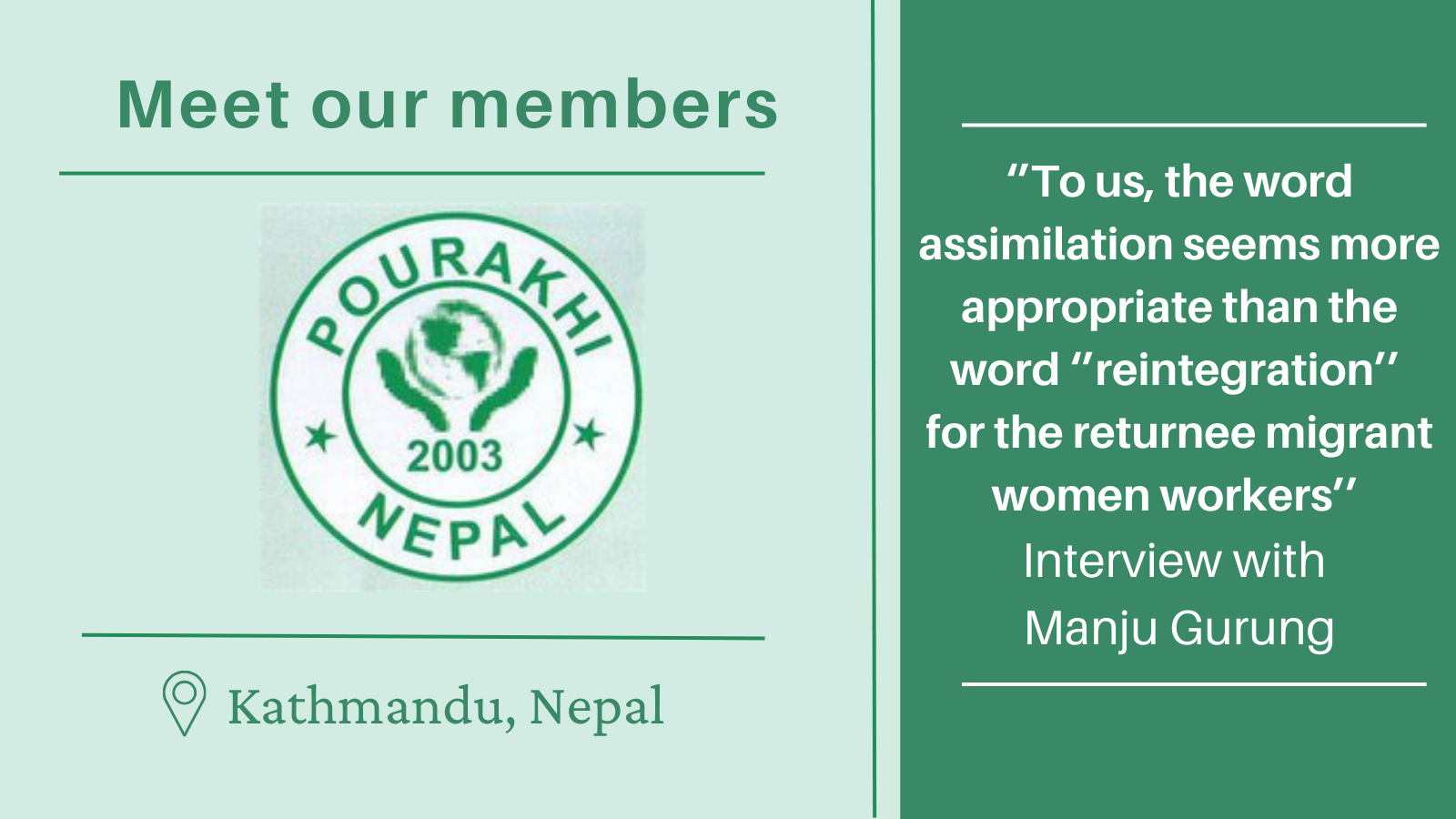Established in 2003 by returnee women migrant workers, Pourakhi Nepal is a pioneering organisation advocating for the rights and well-being of Nepali migrant workers, especially women. Their work spans from providing emergency shelter, psychosocial and legal support, and reintegration assistance, to conducting policy advocacy on migration, trafficking, and citizenship rights. Vivian Cartagena, Programme Officer Alliance Strengthening had an insightful interview with Manju Gurung, the co-founder and Chairperson of Pourakhi Nepal.
Vivian: Welcome, Manju, and thank you for giving us your time. I would like to ask you how and why Pourakhi was founded? What was the context at that time?
Manju: We started Pourakhi Nepal in 2003. At that time, we were not aware about the rights of migrants. To start with, there were seven founding members, and in this initial phase, there was a man called Krishna with us. He was an engineer by training. In Nepal, it was very challenging for us to start an NGO, so he assisted us in establishing this organisation. He supported us when we had to go to the district administration office and collect documents related to the citizenship of every individual member.
Another challenge was the political context in Nepal; at that time, there was a lot of instability. The Maoists were there, so it was pretty tough for us to organise and raise our voices collectively. They could prove to be a threat if they came to know that we were migrant workers who had gone to other countries to earn money. They could come after us and ask for donations, and so we did not want to disclose that we were migrant workers. Also, as women, it was scary to disclose that we were migrant workers. There is a huge social stigma against that and it still persists. At that time, it was even worse. It was very hard to raise our voices then.
These were all the complications and challenges we faced when we started our organisation. Also, I might add that we were not aware about the rights of migrants and, even worse, we were not aware of our labour rights.
After all of this, we started our journey with Krishna Gurung as the founder chair of the organisation. Later on, UNIFEMM, now UN Women, showed interest in us. They said that if women are leading an organisation, then they will be able to support our organisation in terms of organisational development and empowerment. That’s how I started leading the organisation and they began to invest in us. They nurtured us and provided us with capacity building training on: literacy, psycho-social well-being, how to write proposals, reports, etc. With the support of UN Women, we devised our own strategy, set our own vision, goals, and objectives.
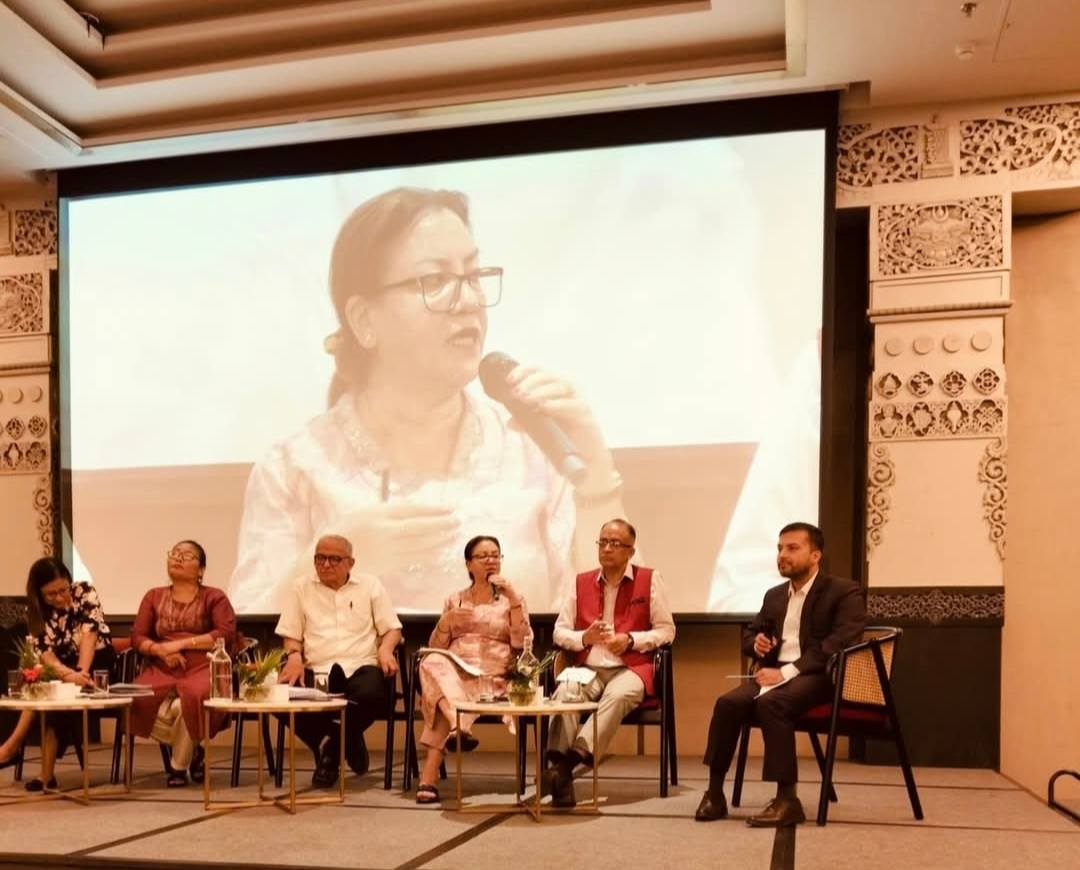
Years later, the Nepal Center for Contemporary Research (NCCR) conducted a government supported research on migrants. One of its findings was that migrant workers were still going to different parts of the world without proper information. As a result, they faced many challenges during their migration process. That’s how in Nepal we started a radio programme for the migrants. I used to host and prepare all the writing for the programme. I started to read up on the rights of migrants to gather some knowledge. Through this radio programme, we disseminated information regarding the pros and cons of migration, dos and don’ts, civil migration, the challenges and the rights of migrants. That was Pourakhi Nepal's first activity.
The effect of our radio programme was such that our listeners spontaneously began to form clubs at the community level and disseminated information to potential migrants and their families and the returnee migrants. All of this was done through listening to our radio programme. There were more than 300 listeners clubs all over Nepal at that time.
When UN Women initiated a project with us, we were able to expand our area of work. We started to work on the reintegration programme. That’s when we understood that advocating for migrants’ rights was not enough; we needed to provide services to migrant workers as well. It became clear to us that many Nepali women were migrating to the Middle East and GCC countries as domestic workers and these women were literally illiterate and unaware about their rights. They had no access to information and services provided by the government. We tried to assist them, and in that process it became clear to us that the women needed shelter as well. During their migratory process, the Nepali government had imposed some bans and even preconditions to migrate, especially for domestic workers. So, domestic workers were, and continue to be, the most vulnerable migrants. We continue to support migrant domestic workers with shelters in the initial phase where we provide them with food and accommodation, but there are some who also need psychosocial counselling, medical support, and livelihoods and life skills training.
We started this shelter in 2009 and from that year onwards until this date, we have provided support to approximately more than 4,500 women. There are women who come with an unwanted pregnancy, others have children, and some who come on account of the many physical abuses that they have suffered or are mentally unstable. We provide assistance to all. Also, through the shelter, we assist them in reintegrating into their communities and society. Although we take strong exception to the term reintegration, but through the research that GAATW and Pourakhi Nepal did on reintegration of returnee women migrant workers during the COVID period, we found out that the women were truly socially, economically, politically, and culturally excluded. They were never integrated into their families, communities, and society. We wondered as to which other word can be used in place of the term reintegration. To us, the word assimilation seems more appropriate than the word reintegration.
Apart from the shelter, we have a paralegal department that assists migrants who need access to justice. They usually face a lot of challenges, like fraud, during their migratory process. We support both men and women in these situations. To date, we have helped more than 12,000 migrant workers who needed services such as rescue, repatriation of dead bodies, and compensation from the government, recruitment agency, middle man, or the broker. This is how the paralegal department is engaging to assist migrant workers.
Vivian: Regarding the paralegal department, when did it start and how was it formed? Is it only members from Pourakhi Nepal, or does it have lawyers working as volunteers as well? And in these cases, who do you look to for access to justice?
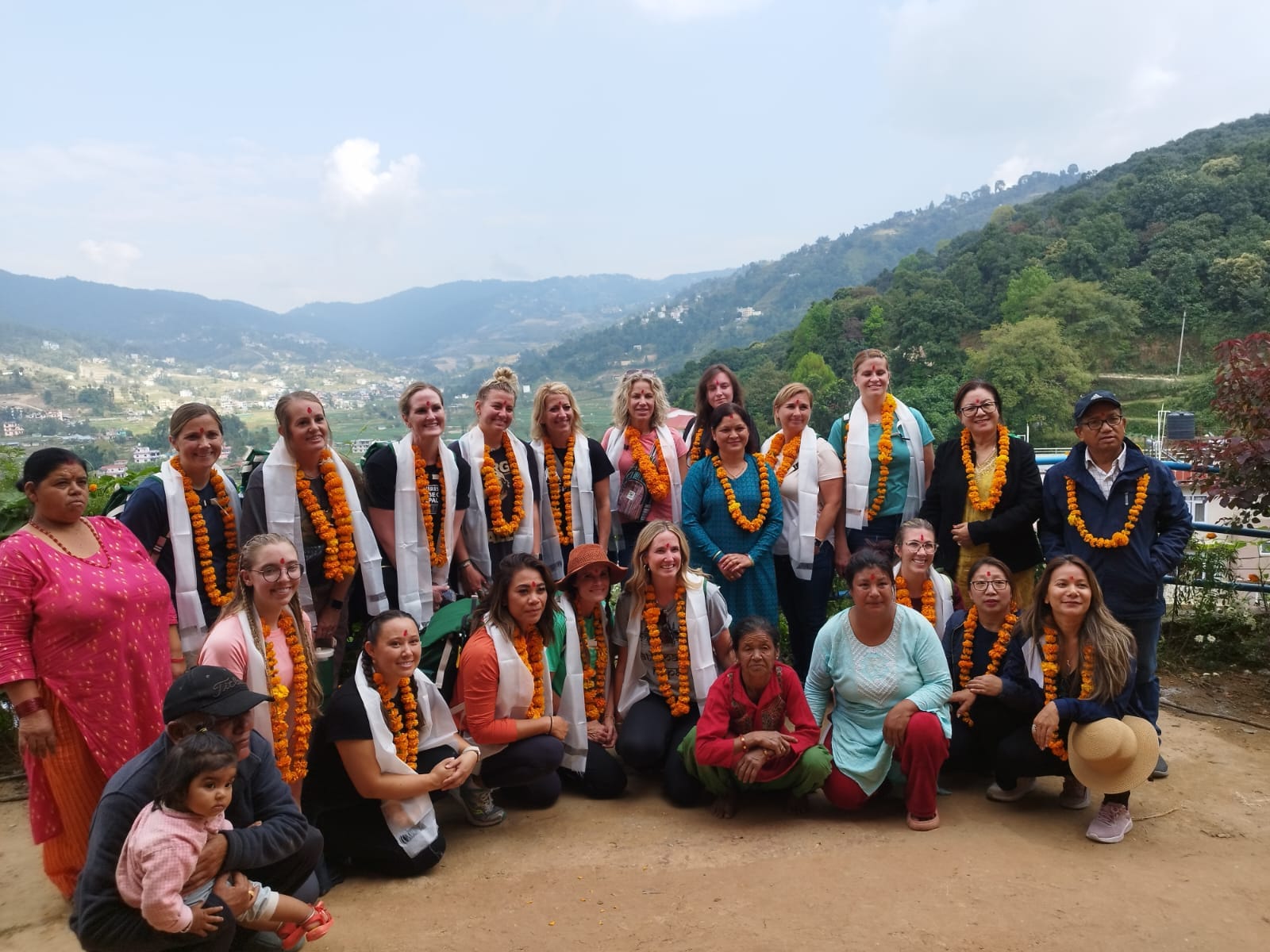
Manju: There is a huge stigma against migrants; they face multiple challenges during the migration process. As part of our strategy, we are trying to empower returnee migrants. Our paralegal officers are based in our main office and in 21 districts of the country. These officers are actually returnee migrant workers themselves. We train them as paralegal officers, and they report the cases to us at the head office. We then ask them to continue the process to access justice. Sometimes we have to file a case and fight in a court of law. In such a case, we consult our network of lawyers who then assist us in a legal battle.
Vivian: I was wondering what kind of cases are common there? For example, labour exploitation or anything related to violence? What kind of cases do you assist with?
Manju: There are many cases related to rights violation and wage theft. The usual cases are about rescue and repatriation, but there are also cases relating to fraud, underpayment, or no payment at all.
Vivian: I’d like to go back to your radio programme. Since you’ve continued with it and mentioned a community of listeners, I’m curious to know if you engage directly with migrant workers to understand firsthand the challenges and forms of violence they face? And if so, how do you incorporate their voices into your organisation’s work, whether through the radio, shelter services, access to justice, or other programmes?
Manju: As we document all the cases, we try to gather information on the kind of challenges faced by migrant workers and we use the compilation as an advocacy tool at the three levels of government. Even at the international and rural level, as well. We take the top to bottom and bottom to top approach. Actually, our major activity is policy advocacy, so we use the information we collect to engage with relevant stakeholders and advocate with the government.
In some cases, based on the specific needs of migrants and our organisational capacity, we also provide direct assistance. We coordinate with relevant stakeholders, including local governments and even private sector actors. For instance, if a woman or man needs employment or wants to start a small business, we provide support such as entrepreneurship development training and agricultural training, often in collaboration with local authorities. This helps them build livelihoods and generate income within their own communities. We tailor our support to each individual’s needs, but we know this is not enough.
That’s why we also push for systemic change. We advocate at the policy level and within communities and local governments, raising migrants’ voices to ensure their needs are reflected in government decisions. For example, the government introduced a reintegration directive for returnee migrants. However, it only applies to those who are formally documented. Since most women migrants are undocumented, we are advocating for the directive to include them as well. This is one of the key gaps we are highlighting in our policy advocacy with the government.
Vivian: Right. Also, I remember that during GAATW’s visit to our members in Nepal, you shared that Pourakhi’s focus area is on the citizenship and statelessness of the children of migrant women workers. Can you tell me more about this, and how Pourakhi is working on that?
Manju: As I told you, we are running an emergency shelter home where women migrant workers come with their children. These children are stateless and because of this, we are trying to advocate with the government to provide them with identity and citizenship. With two other organisations, we run a campaign on the rights of citizenship. This is one of our major activities in relation to the children of migrant workers. We are leading this issue.
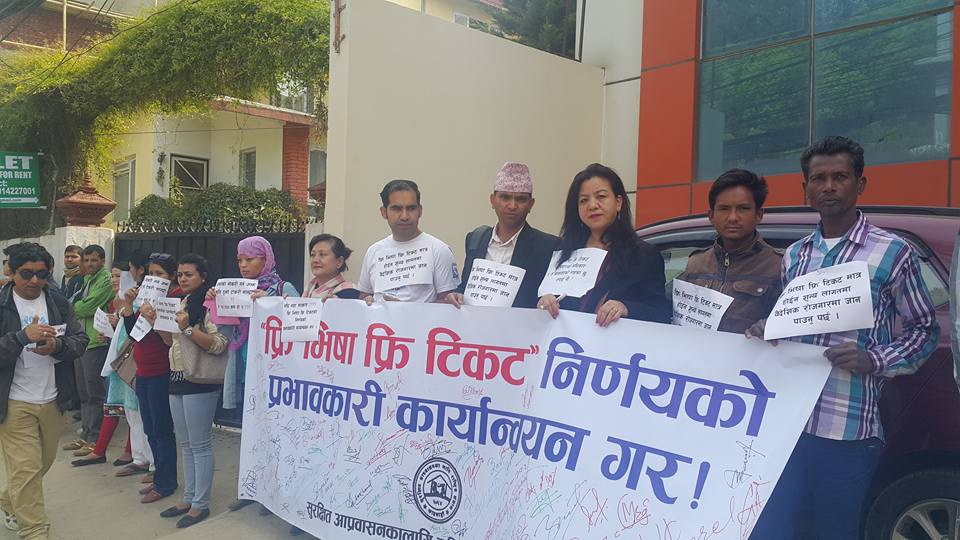
We have done many street protests and petitions to the government of Nepal, and organised round table meetings with policymakers. We have petitioned the Human Rights Commission, National Women’s Commission, and the Foreign Employment Board, as well as other constant stakeholders that can influence the government.
Vivian: Okay, I understand. And within this context, does Pourakhi take up initiatives for combating trafficking? Because, on one hand, being without citizenship in the case of the children is a risk factor, and on the other hand, the women migrant workers who return to Nepal and cannot actually reintegrate properly or are left behind, are also more vulnerable to become victims of trafficking. Is Pourakhi currently focusing on trafficking, or are other actors focusing on that?
Manju: Yes, this is a major concern throughout their migration process. Many women experience trafficking, smuggling, and other exploitative situations while migrating. At Pourakhi, we support women migrants by providing shelter, reintegration support, and through ongoing advocacy efforts.
We aim to address these risks at every stage of the migration journey. Our reintegration programme helps returnee women migrants, many of whom have faced exploitation or trafficking. At the same time, we work to raise awareness and push for stronger government action. We are continuously engaging with the government to highlight these vulnerabilities and ensure better protections are in place for women migrants. We focus especially on their migration process, which is when they are most at risk.
Vivian: Right, so Pourakhi is addressing this issue in a comprehensive way in order to guarantee the rights of women migrant workers and their children. With regards to these focus areas, I would like to know, how do you see Pourakhi Nepal in the next few years? What are your plans for the future? What would you like to achieve in the next two or three years with the support of GAATW?
Manju: We are proud to be a member of GAATW, and we got a lot of opportunities to develop our capacity that has allowed us to move ahead. Regarding our plans for the future, at the moment I am engaging more in policy formation. I am a member of the Foreign Employment policy draft, and of the Foreign Employment Board. Through this board, I am trying to engage with the government of Nepal to address issues of the mobility rights of women and of trafficking survivors – to assist survivors and to combat trafficking and smuggling.
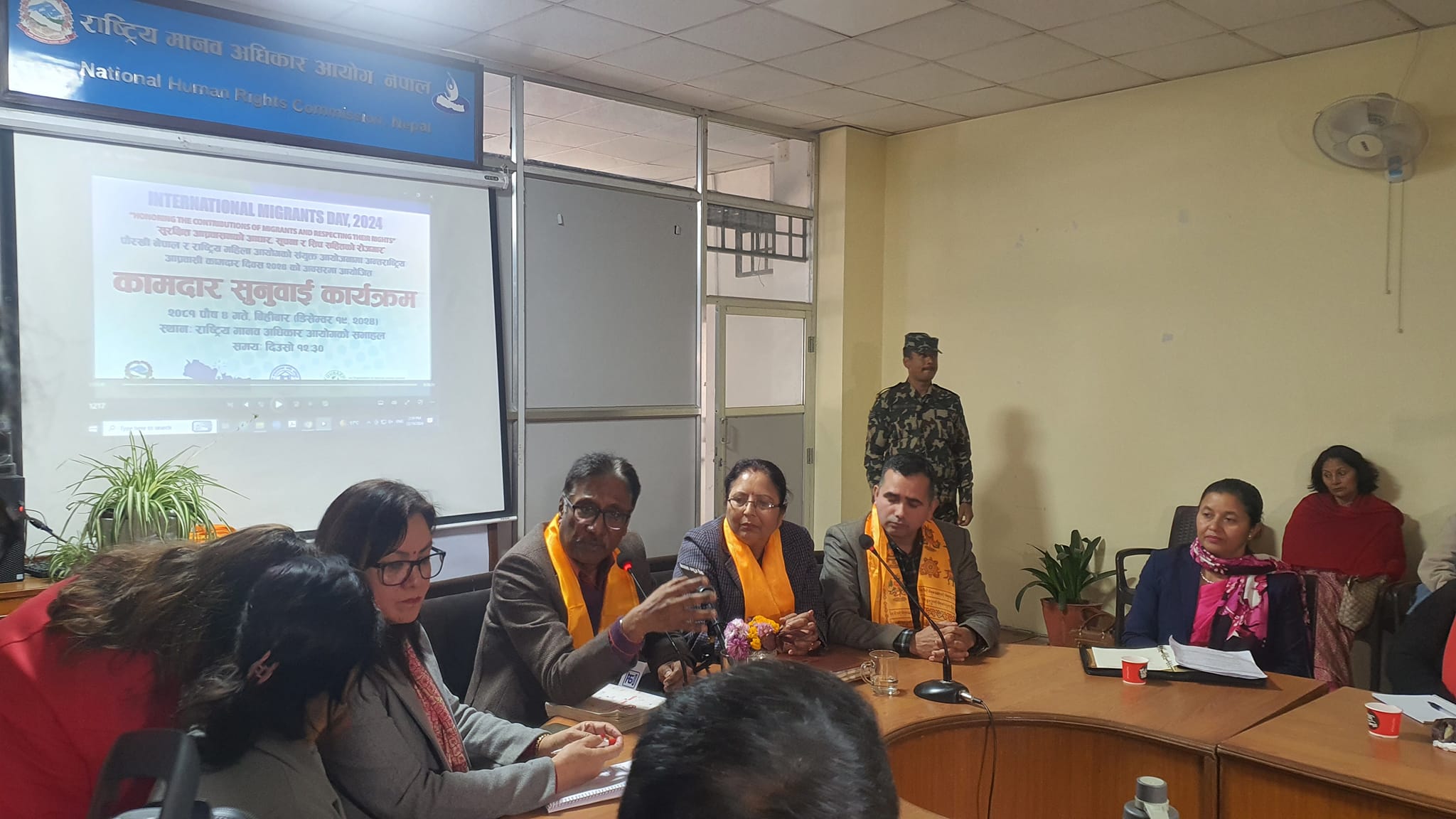
At the national level, we are working towards the harmonisation of the Human Trafficking Act with the Foreign Employment Act. There is a huge gap between the two, but we believe that the two have to work in tandem. So we have to have more clarity in order to address this issue. Hopefully, we will be able to achieve that. But first, we have to do a lot of awareness raising and empowering the real people who are in the community. These are the main issues where we are looking for GAATW’s support. We will also need support with emerging issues like climate justice, and business and human rights issues. We are incorporating these issues in that arena as well.
Vivian: Actually, that is very interesting for us. One of our thematic groups, the one on migration, is also addressing this area of climate justice or climate crisis in relation to the people who have been displaced due to these events. We are looking forward to working on this issue with our members as well! Thank you, Manju, for your time and all the insights about Pourakhi’s current work and future plans.

